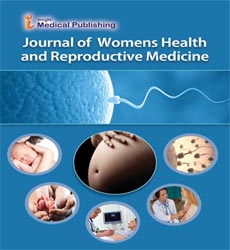Advancing Women's Health through HIV Research
Benjamin Brooks*
Women's Health Unit, University of Strasbourg, Strasbourg, France
- *Corresponding Author:
- Benjamin Brooks
Women's Health Unit, University of Strasbourg, Strasbourg,
France,
E-mail: Rivers@gmail.com
Received date: February 17, 2024, Manuscript No. IPWHRM-24-18744; Editor assigned date: February 20, 2024, PreQC No. IPWHRM-24-18744 (PQ); Reviewed date: March 04, 2024, QC No. IPWHRM-24-18744; Revised date: March 11, 2024, Manuscript No. IPWHRM-24-18744 (R); Published date: March 18, 2024, DOI: 10.36648/ipwhrm.8.1.81
Citation: Benjamin B (2024) Advancing Women's Health through HIV Research. J Women’s Health Reprod Med Vol.8 No.1: 81.
Introduction
In the last forty years, significant scientific progress has led to considerable advancements in addressing the HIV epidemic. However, certain groups, including women especially those from racial and ethnic backgrounds underrepresented in research, young women, transgender women, and gender diverse individuals, continue to be disproportionately impacted by Human Immunodeficiency Virus (HIV). Globally, women constitute 63% of those affected by HIV. Throughout this Position Paper, the term "women" encompasses both cisgender and transgender women. For conciseness and clarity, we interchange between cisgender and transgender women in some instances while using "women" in others. In the United States, approximately 45% of Black transgender women and 36% of Latinx transgender women are living with HIV. It is imperative to prioritize the health of cisgender and transgender women and girls, transgender men and boys, and gender diverse individuals across all stages of HIV research. Progressing HIV research and clinical care for all women affected by HIV, throughout their lives, and ultimately halting the HIV pandemic, necessitates continual and meaningful involvement of women and gender diverse individuals.
Multifaceted issues
The NIH Office of AIDS Research (OAR) and Office of Research on Women's Health (ORWH) jointly organized the 2023 NIH OAR-ORWH Women & HIV Symposium during the 13th International Workshop on HIV and Women to inaugurate a new collaborative program focused on HIV and women. This symposium, a unique annual event in the international arena, prioritizes both community and research viewpoints. By bringing together both emerging and established investigators, the symposium aimed to spotlight areas of concern, opportunities, and challenges faced by women, girls, and gender diverse individuals affected by HIV. The selected topics shed light on ongoing NIH research endeavors, encompassing aspects such as social determinants of health, maternal health issues, aging, and chronic illnesses among women. However, due to time constraints, not all pertinent subjects could be thoroughly discussed. The HIV epidemic among women and gender-diverse individuals, especially younger females, is influenced by various factors such as biology, society, structures, and politics. It's crucial to recognize the diversity within this demographic group and tailor HIV testing, treatment, and prevention efforts to their specific vulnerabilities, incorporating community feedback and ensuring accessibility.
Innovative prevention
Despite progress in understanding the structural and biological aspects of HIV susceptibility among adolescent girls and young women, obstacles to controlling the epidemic persist. These include entrenched gender and cultural norms, issues related to sexual and reproductive health and rights, gender and racial disparities, Gender-Based Violence (GBV), and Intimate Partner Violence (IPV), all of which contribute to HIV transmission. Sub-Saharan Africa bears a significant burden of both IPV and HIV, with a notable fraction of incident HIV cases attributed to IPV among women in the region. The Females Rising through Education, Support, and Health (FRESH) Study, initiated in 2012 in Durban, South Africa, focuses on the needs of adolescent girls and young women. Its primary goal is to investigate the initial immune responses following HIV acquisition, aiming to inform the development of innovative prevention and cure strategies. The study recruits sexually active young women aged 18–23 without HIV, who undergo frequent HIV-1 RNA testing to promptly detect new infections and begin treatment during early stages. Participants also engage in a program offering life and job skills training, including computer literacy, career planning, and HIV prevention support such as access to pre-exposure prophylaxis (PrEP).Despite the particular challenges faced by adolescent girls and young women in HIV prevention and treatment, they have been notably underrepresented in HIV cure trials, with only 17% of participants being female according to a 2019 analysis. To address this gap, the first HIV cure trial in Africa was launched at the FRESH research site in 2022, assessing a combination of dual broadly Neutralizing Antibodies (bNAbs) and a toll-like receptor agonist. Targeting young women from FRESH who began Antiretroviral Therapy (ART) during acute infection and have limited viral reservoirs may enhance their chances of achieving HIV cure or post-treatment control. Ensuring the inclusion and retention of women, especially adolescent girls and young women who are disproportionately affected, is crucial for equitable access to HIV cure research studies. Community input should be prioritized throughout the study's development process.
Open Access Journals
- Aquaculture & Veterinary Science
- Chemistry & Chemical Sciences
- Clinical Sciences
- Engineering
- General Science
- Genetics & Molecular Biology
- Health Care & Nursing
- Immunology & Microbiology
- Materials Science
- Mathematics & Physics
- Medical Sciences
- Neurology & Psychiatry
- Oncology & Cancer Science
- Pharmaceutical Sciences
